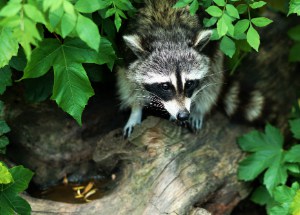Raccoons are pretty cute creatures. However, they are not as harmless as they might seem at first glance. And their feces are especially dangerous. Since wild animals do not receive vaccinations and vitamins, they carry numerous diseases (like Leptospirosis).
Their feces and urine are simply teeming with dangerous parasites (for example, Baylisascaris procyonis or Giardia). They can infect both pets and humans, so direct contact with raccoon poop is highly undesirable.
In this article, you will find detailed information on how to detect these animal excrements, why it is dangerous, and how to get rid of it.
Raccoon Scat Identification & Cleanup Guide
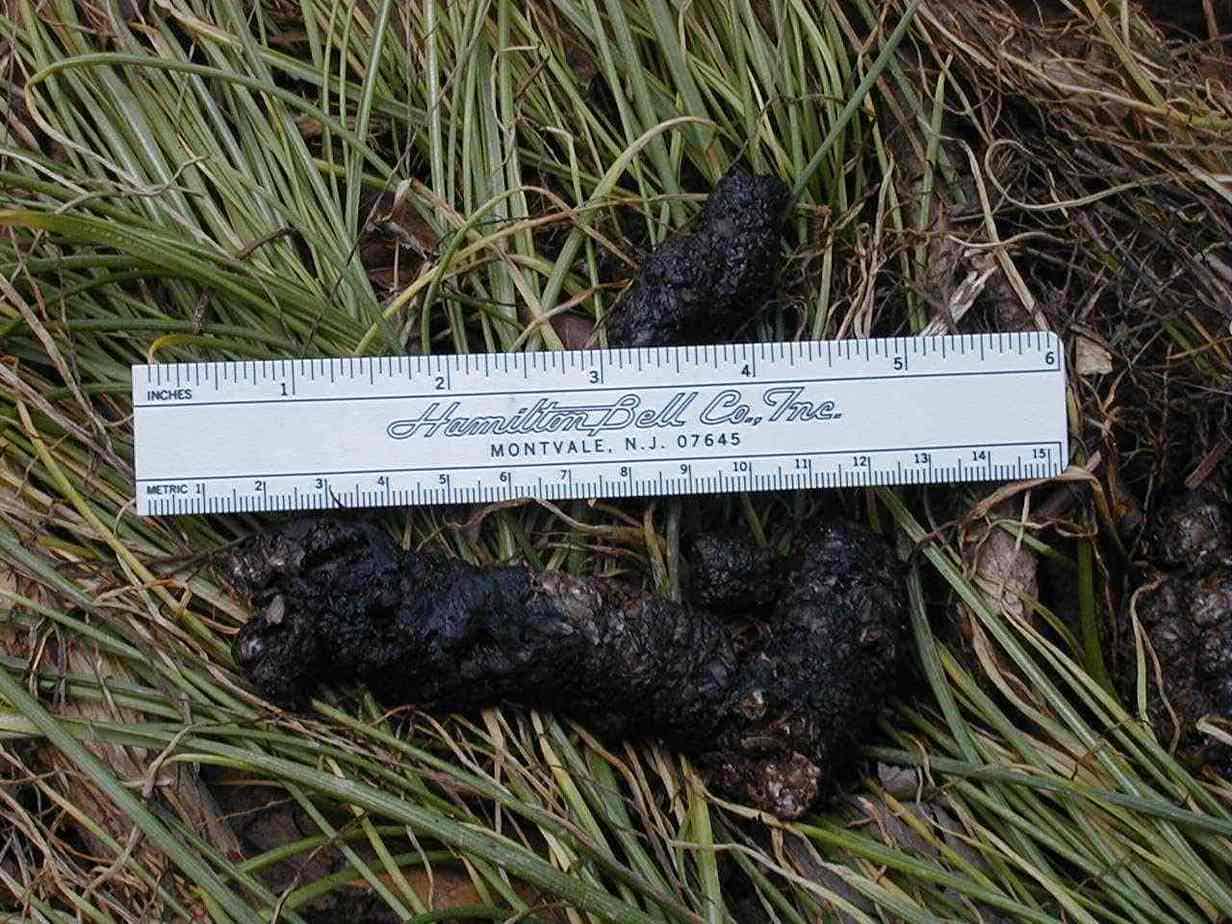
Although raccoons are omnivores and can find enough food in the wild, they prefer to settle near humans, as it gives them easier access to a food source. Their excrements are dangerous for farm animals, pets, and humans.
Raccoon scat identification
A distinctive feature of these animals’ behavior is that they prefer to go to the toilet in one place. If a whole family has settled next to you, they will all poop in one corner. So, what does raccoon poop look like?
In general, I can say that their scat is similar to dog excrement. It is dark in color, usually no more than 3 inches long, has an elongated cylindrical form, and a strong smell. Their feces are just as easy to identify by pieces of berries and fruits in them.
If you find products excreted on your site that fit this description, look for pictures of raccoon feces on the Internet to make sure that a raccoon has settled near you.
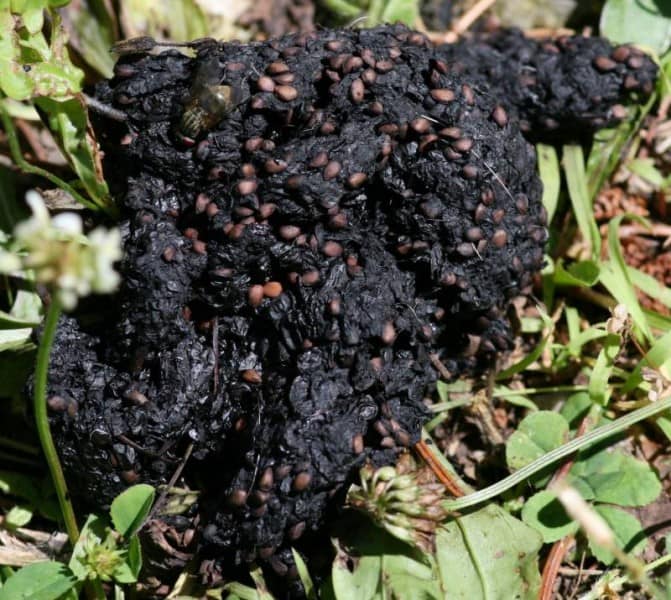
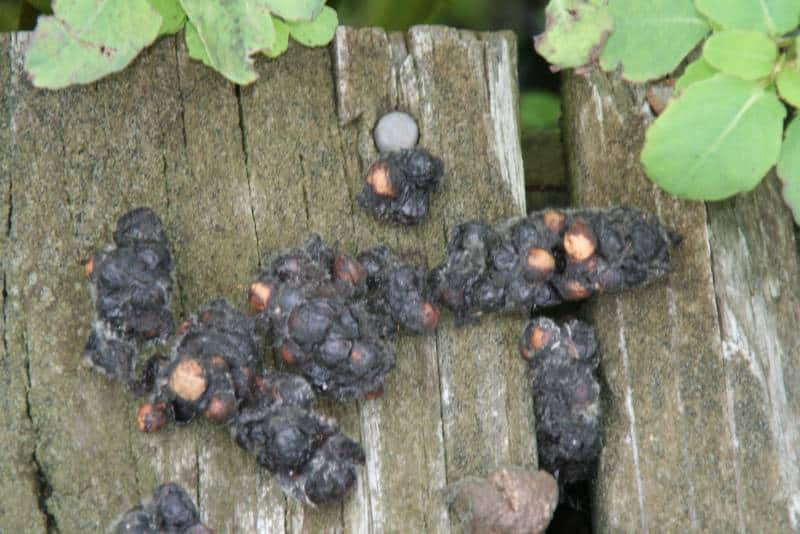
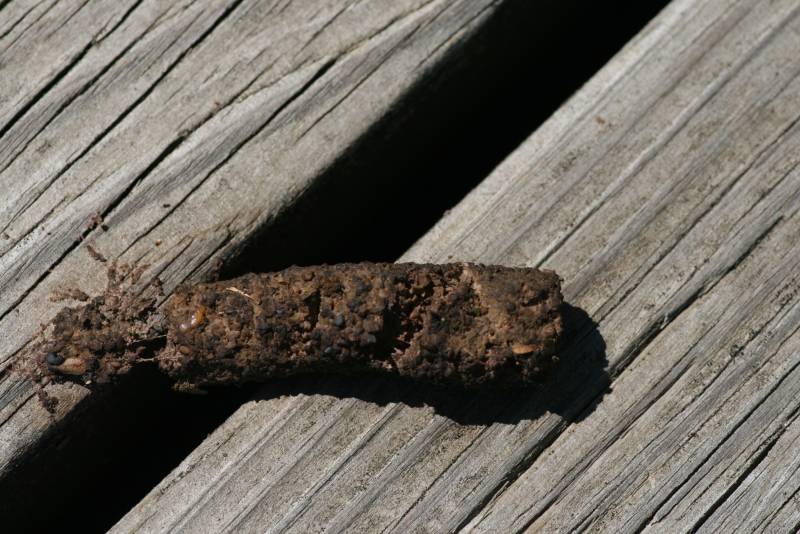
Raccoon excrement dangers
You can get some serious and sometimes deadly diseases through raccoon feces.
Leptospirosis is a bacteria found in raccoon urine. If it gets on an open wound, you can easily become infected. In most cases, Leptospirosis is treatable. But it can cause kidney problems and meningitis with fatal consequences for the human body.
Salmonella is another bacterium that lives in raccoon waste and causes salmonellosis. The infection enters the body through the ingestion of food.
Giardiasis is another intestinal infection that can be contracted after contact with feces. Its treatment should take place under the supervision of specialists and in several stages since the death of microorganisms in medicine has a strong toxic effect on humans.
Roundworms (particularly Baylisascaris procyonis) are the most dangerous parasite that can be contracted from these animals. To get sick with ascariasis, you just need to inhale a pair of Ascaris eggs (you can see them on the images of raccoon poop). Roundworms affect the brain, eyes, spinal cord, causing irreversible damage to the vital systems or even death.

Raccoon poop removal
I think from the previous section, it is quite clear that getting rid of raccoon poops is a must. These animals often make latrines near large trees, fallen trunks, patios, attics, or garages.
Safety measures
Before cleaning, wear old clothes that cover your arms and legs, which will be ok to throw away. Put on thick disposable gloves on your hands and rubber boots or heavy overshoes on your feet, which you can later get rid of.
Be sure to use a respirator even if you plan to work outdoors, and even more so when cleaning indoors. I also recommend wearing glasses to protect your eyes’ mucous membrane from the accidental ingestion of bacteria.
[su_note note_color=”#e5e2d4″]Related post: Recommended Raccoon Traps [/su_note]
Raccoon droppings disposal
When all the preparations are in place, follow these steps to remove poop:
- Use an inverted plastic bag or shovel to pick up feces.
- Place excrement in a tightly sealed bag or container. You can landfill or incinerate the packaging.
- Remember that chemicals cannot completely kill bacteria.
- Outdoors: treat all surfaces (including a shovel) with a propane torch or boiling water.
- Indoors: Wipe all surfaces several times with a damp, soapy sponge. The water will need to be poured into the toilet, the bucket should be disinfected, and the sponge will need to be hermetically packed and sent to the trash.
- Wash your hands thoroughly with soap water and use a disinfectant.
- Wash clothes at high temperatures with detergent.
Infestation
In addition to poop, raccoons leave quite a lot of other traces, by which it is easy to calculate infestation. First, you will encounter a lot of damage: wiring, patios, walls, shingles, etc. Secondly, raccoons love to feast on human food, often climb into trash cans, and scatter the remains of food around.
Thirdly, they can cause significant damage to crops and even destroy chicken nests. All this, combined with excrement smell, paw prints, and loud fiddling in the attic or between the walls, indicates that raccoons have settled on your site.
[su_note note_color=”#e5e2d4″]Related post: Recommended Raccoon Repellents [/su_note]
Keep Wild Animals Away From Your Site
As you can see, not only animals themselves are dangerous, but also their scat. Do not leave food or water in accessible areas and close trash cans carefully to avoid managing raccoon damage. If they have already settled on your site, before the arrival of specialists, wash your hands thoroughly in soapy water after working outdoors. It is not recommended to try to get rid of raccoons on your own, as they are very cunning, intelligent, and vindictive creatures.
Please tell me about your experience with these pests. What signs of them did you find on your site?
References:
- Leptospirosis (Cornell University):
https://cwhl.vet.cornell.edu/disease/leptospirosis - Baylisascariasis (Centers for Disease Control and Prevention):
https://www.cdc.gov/dpdx/baylisascariasis/index.html - Raccoon Latrines: Identification and Clean-up (Center for Global Health):
https://www.cdc.gov/parasites/baylisascaris/resources/raccoonlatrines.pdf - Raccoons: Damage Management (Iowa State University of Science and Technology):
https://naturalresources.extension.iastate.edu/encyclopedia/raccoons-damage-management

